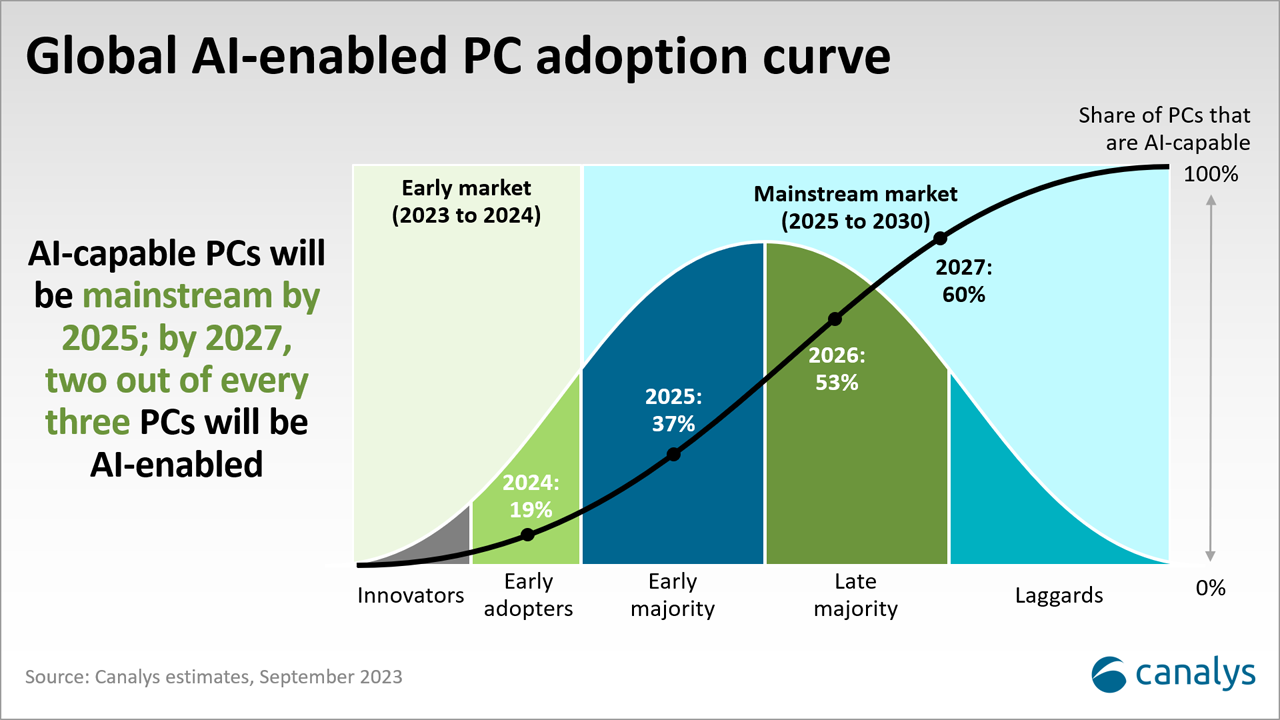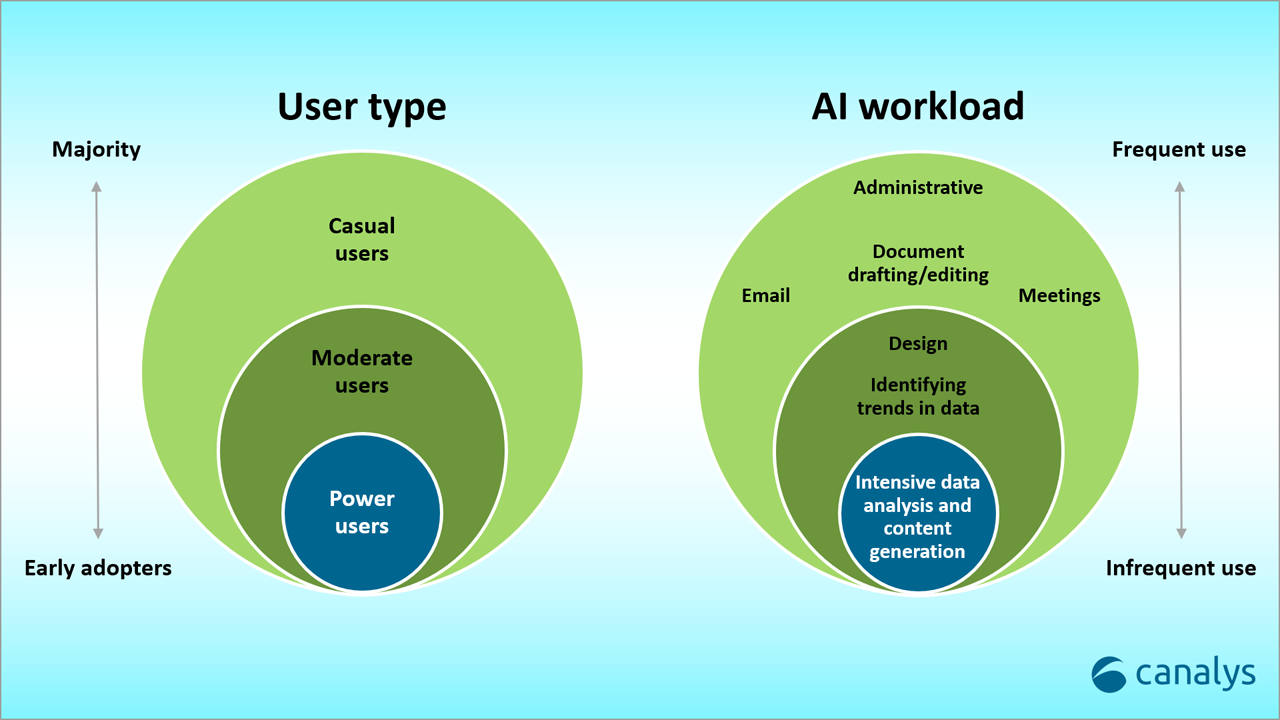Canalys projects 60% of PCs shipped in 2027 will be AI-capable
18 September 2023
Canalys is part of Informa PLC
This site is operated by a business or businesses owned by Informa PLC and all copyright resides with them. Informa PLC’s registered office is 5 Howick Place, London SW1P 1WG. Registered in England and Wales. Number 8860726.

A new generation of AI-enabled PCs will transform the way we work, enabling people to supercharge their productivity and unleash their creativity.

A new generation of AI-enabled PCs will transform the way we work. A hybrid of cloud and on-device computing will enable people to supercharge their productivity and unleash their creativity. Driving a paradigm shift toward the era of the “AI PC”, which will greatly improve performance, security and personalization. Still in its infancy, Canalys has developed a benchmark definition of what makes an AI-capable PC. Here, we envision the possible use cases and adoption curve of AI-enabled PCs within the commercial segment.
Canalys predicts that adoption will initially be limited to specific business functions and tech-savvy power users who require powerful hardware to run intensive AI workloads. But over the next five years, AI-capable PC proliferation will be driven by the emergence of a marketplace of fine-tuned large language models (LLMs) and AI tools, and revamped operating systems defined by strong AI integration. As the software catches up to take full advantage of AI-capable PCs, adoption will gather steam in 2025 as the second generation of AI-enabled PCs coincides with the forecast market replacement cycle. AI-enabled PC deployment will steadily expand to other business functions and Canalys predicts that by 2027, 60% of PCs will be AI-capable.

Canalys believes the first deployments of AI-capable PCs to businesses will be limited to specific organization types and employee roles. Examples include research and development, developers, engineers, data analysts and artists. These early adopters will take advantage of AI-enabled PCs’ faster processing power when working on specific tasks. Game developers will be able to generate entire levels based on a small manually created section that the AI trains itself with. Designers can give the AI rough sketches to build and iterate on. Scientists will be able to run complex models faster, as the processing doesn’t have to do a round trip to the cloud. Developers and data analysts can use their PCs’ AI capabilities to quickly identify trends in their data, all while having total confidence in their security as the data never leaves the devices.
But these early adopters will be a niche target market. This is mainly because the market’s current cost sensitivity conflicts with price barriers. AI-capable PCs are high-end PCs that require sufficiently powerful components to run AI workloads locally. Furthermore, many AI-driven applications will have their own cost structure separate from the devices. Using Microsoft 365 Copilot as an imperfect example (it’s currently run exclusively in the cloud, though we predict this will change). Copilot costs US$30 per user per month. Compared to the price of Office 365 Enterprise plans, this additional service could double (Office 365 E5 costs US$38 per user per month) or even quadruple (Office 365 E1 costs US$10 per user per month) costs. With commercial IT spending expected to remain damped until at least early next year, businesses will initially be selective as to what roles have access to AI-enabled PCs.
Over time, Canalys predicts two significant developments. First, there will be a surge in new AI applications optimized for on-device AI processing, including the transition of existing cloud-based AI apps to a hybrid model that combines cloud and local processing. Second, the integration of AI on devices will lead to price reductions for many AI applications, making them more accessible to a broader range of users.
The early adopters won’t be able to keep their monopoly on this innovation for long. Productivity follows an 80/20 rule. We spend 20% of our day working on tasks that produce 80% of the day’s value. The remaining 80% of our day we spend going to meetings, replying to emails or doing other administrative work. Over time, having an on-device AI will be like having a digital twin that helps us with our jobs. Imagine an AI’s been trained to draft responses to your emails in a perfect copy of your tone and style: whether you begin with Dear or Hello, prefer British or American English or have a propensity for an Oxford comma. AI-enabled PCs could perform real-time transcription or translation of meetings and then provide all attendants with a summary and required follow-up actions. AI-enabled PCs have the opportunity to radically transform the way we work and how we spend our time.
Privacy concerns will be paramount. Marketing AI-capable PCs must prioritize security as a key benefit, reassuring users that their data remains on devices, mitigating privacy concerns.
The commercial PC market is poised for growth over the next two years, coinciding with the end of life for Windows 10, scheduled for late 2025. Canalys believes this will serve as an inflection point for the widespread adoption of AI-capable PCs within businesses. With the expected release of AI-enhanced features in the latest version of Windows by late 2024 and the pervasive integration of AI tools into commercial and productivity software, the AI-capable PC market is primed for substantial expansion in 2025 and 2026.
In Canalys’ view, the adoption of AI-capable PCs will not add significantly to the overall PC TAM from a unit perspective. Rather, it will largely coincide with the current expected refresh cycle peak around 2024 and 2025, while also pulling forward some demand from future upgrades. OEMs and the channel will see strong revenue opportunities both from selling higher-ASP AI-capable PCs and from the proliferation of new services centered on AI optimization.
While both the consumer and commercial segments stand to benefit from the advances in on-device AI, Canalys believes that adoption by businesses is poised for a more rapid ascent. Furthermore, adoption will initially be driven by organizations that are already tech-savvy, with a strategic approach to leveraging AI for productivity. It will also be focused on job functions where on-device AI is immediately beneficial. The demands of modern work will accelerate the adoption of AI-driven features, such as audio and video optimization, intelligent cooperation and advanced AI for content generation. Canalys believes that over the next five years, the market will see a proliferation of AI-capable PCs, the emergence of a marketplace of fine-tuned LLMs and AI tools, and revamped operating systems defined by strong AI integration. Channel partners will play an important role in evangelizing the benefits of AI-capable PCs and tools as their intimate knowledge of customers’ business needs will be vital to help navigate a new area of complexity. A Canalys poll from May 2023 showed that 41% of channel partners are optimistic the about opportunities associated with AI.